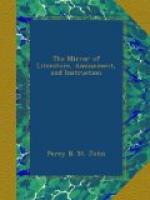“Mr. Brougham speaks in a loud and unmitigated tone of voice, sometimes almost approaching to a scream. He is fluent, rapid, vehement, full of his subject, with evidently a great deal to say, and very regardless of the manner of saying it. As a lawyer, he has not hitherto been remarkably successful. He is not profound in cases and reports, nor does he take much interest in the peculiar features of a particular cause, or show much adroitness in the management of it. He carries too much weight of metal for ordinary and petty occasions: he must have a pretty large question to discuss, and must make thorough-stitch work of it. Mr. Brougham writes almost, if not quite, as well as he speaks. In the midst of an election contest he comes out to address the populace, and goes back to his study to finish an article for the Edinburgh Review, sometimes indeed wedging three or four articles (in the shape of refaccimentos of his own pamphlets or speeches in parliament) into a single number. Such indeed is the activity of his mind that it appears to require neither repose, nor any other stimulus than a delight in its own exercise. He can turn his hand to any thing, but he cannot be idle. There are few intellectual accomplishments which he does not possess, and possess in a very high degree. He speaks French (and, we believe, several other modern languages) fluently: is a capital mathematician, and obtained an introduction to the celebrated Carnot in this latter character, when the conversation turned on squaring the circle, and not on the propriety of confining France within the natural boundary of the Rhine. Mr. Brougham is, in fact, a striking instance of the versatility and strength of the human mind, and also in one sense of the length of human life, if we make a good use of our time. There is room enough to crowd almost every art and




